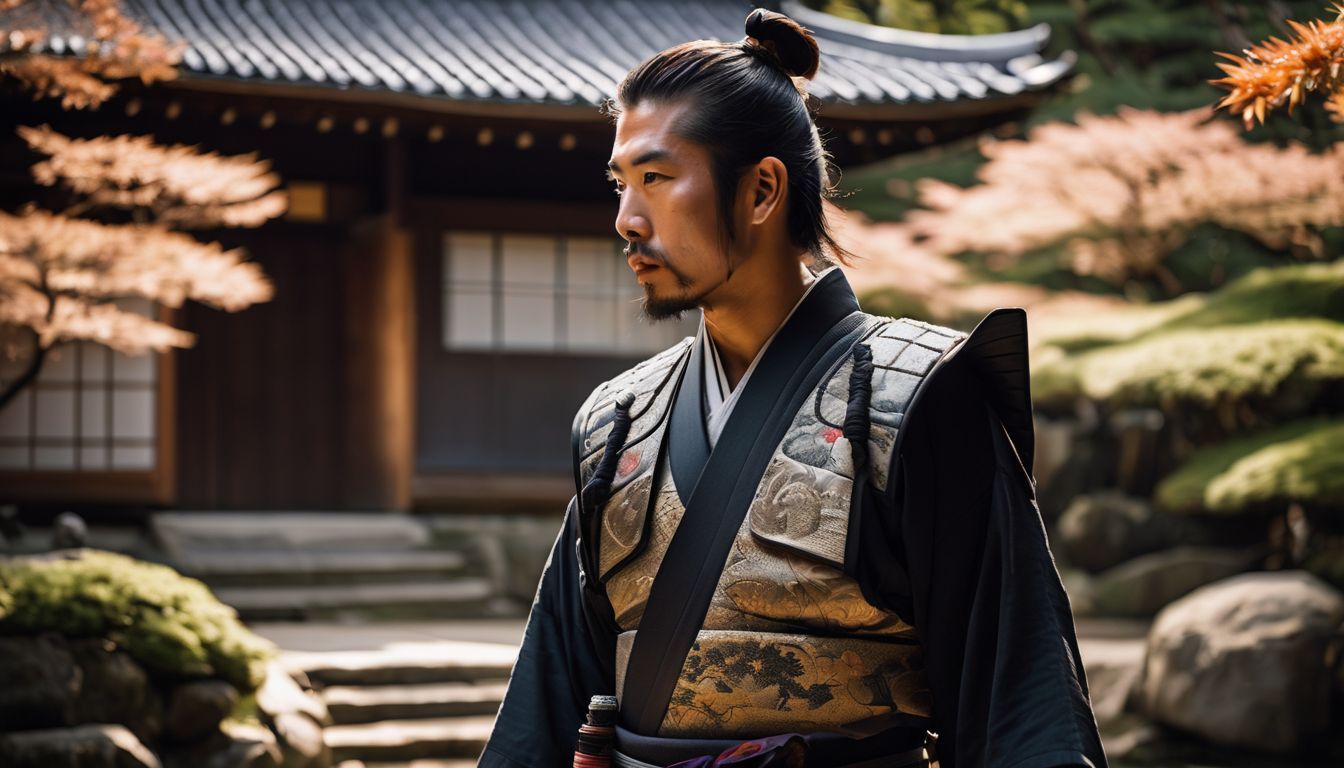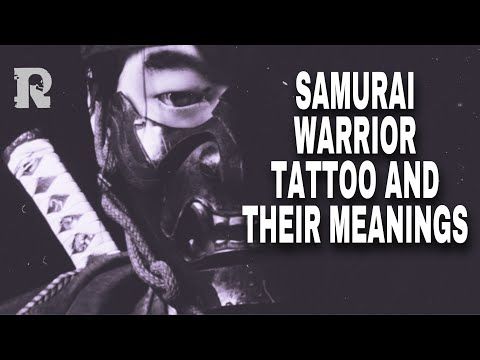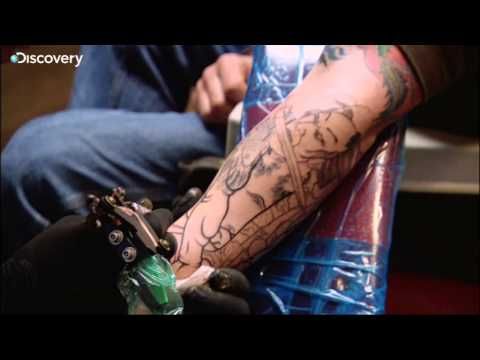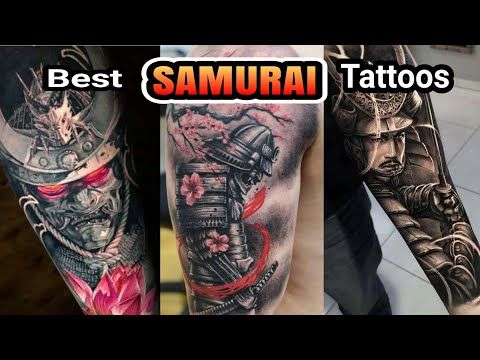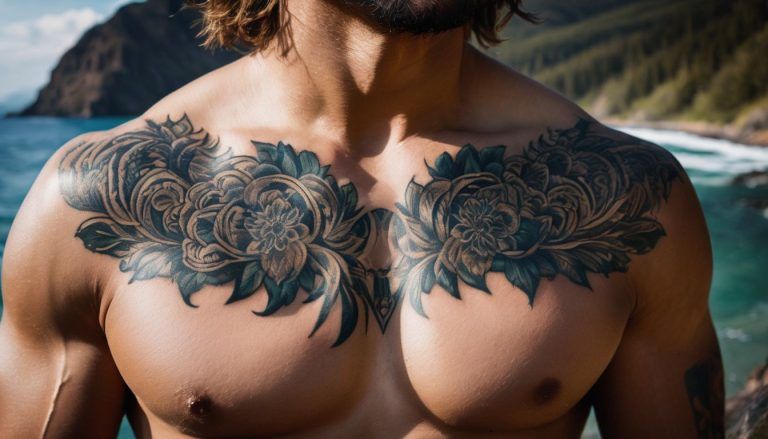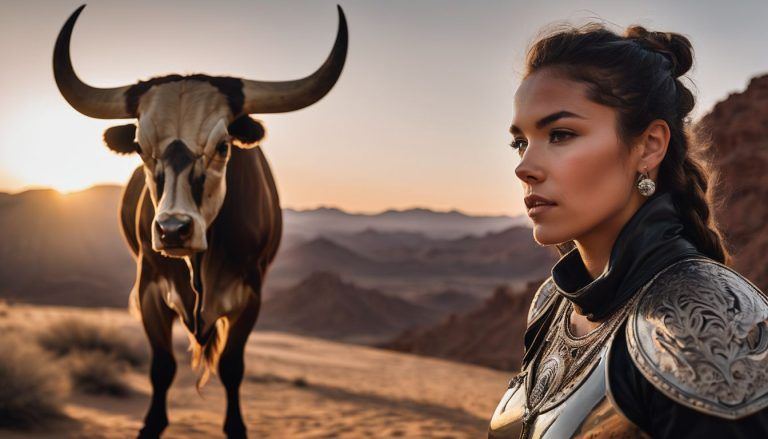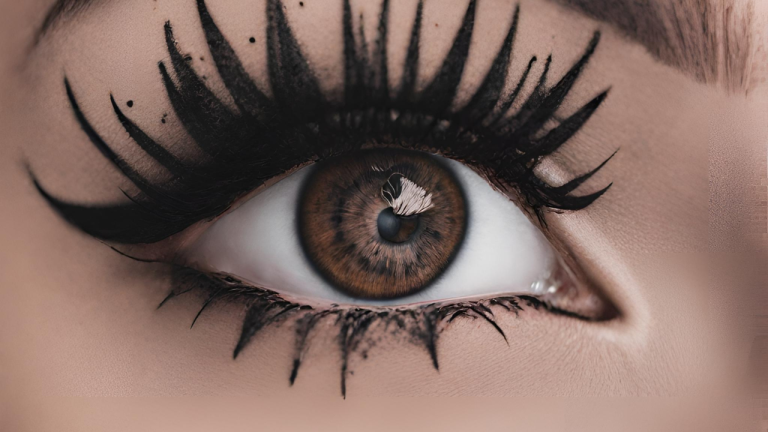Unveiling the Legacy and Symbolism of Japanese Samurai Tattoos
Are you fascinated by the bold warriors of Japan and wondering what their iconic tattoos mean? Samurai tattoos carry a profound legacy, representing courage, honor, and discipline.
This article will take you on a journey through the history and deep symbolism behind these striking designs. Discover your warrior spirit within!
Key Takeaways
- Samurai tattoos are steeped in the cultural heritage of Japan, often including images of warriors, dragons, and cherry blossoms that carry meanings of strength, honor, and the fleeting nature of life.
- Traditional samurai tattoo designs reflect values such as bravery and loyalty while modern interpretations incorporate contemporary elements to suit personal expressions and aesthetic preferences.
- Placement on the body for a samurai tattoo is significant; popular areas include upper arms, back, chest, thighs — each area representing different aspects of the warrior’s ethos like power or resilience.
- Samurai tattoos interweave various symbols like koi fish for perseverance or pagodas for spirituality; these elements enrich the design’s meaning further connecting wearers to Japanese culture.
- Famous samurai tattoos showcase historical figures and mythical concepts symbolizing unwavering courage and determination which continue to inspire individuals worldwide.
History and Significance of Japanese Samurai Tattoos
Samurai tattoos have a rich history and deep significance in Japanese culture. They are symbols of strength, loyalty, and honor, portraying the legacy of the samurai warriors. These tattoos hold traditional meanings and are intricately connected to the values of the samurai way of life.
Traditional meanings
Japanese Samurai tattoos hold deep historical significance, symbolizing the revered qualities of the samurai like strength, courage, and honor. These traditional Japanese tattoos are a testament to the warrior’s code, which includes principles such as bravery and self-discipline.
They often feature iconic symbols associated with samurai mythology and culture, such as masks that represent their armor or cherry blossoms that signify the ephemeral nature of life—a reminder of how these warriors were prepared to lay down their lives in service.
Incorporating elements like dragons or koi fish into the designs not only adds beauty but also layers of meaning related to perseverance and overcoming adversity. The intricate artistry behind each tattoo reveals a story or value important in Japanese warrior culture.
Through these tattoos, wearers connect with Japan’s rich history while honoring the legacy left by these legendary figures who continue to influence modern sensibilities about loyalty, respect, and discipline.
Symbolism of strength, loyalty, and honor
The symbolism of strength, loyalty, and honor runs deep in Japanese Samurai tattoos. These designs represent the indomitable spirit of the ancient warriors, embodying values such as courage, respect, and self-discipline.
The iconic samurai has become a powerful symbol not only in Japan but also globally, inspiring countless individuals to embrace these timeless principles through body art. In Western civilization, the samurai is revered as an emblem of unwavering commitment and bravery.
Furthermore, Japanese warrior tattoos often depict the eight principles that defined the code of conduct for these legendary fighters – bravery, honor, discipline among them – making them a compelling representation of traditional values.
The cultural significance and profound meanings behind samurai tattoos continue to captivate enthusiasts worldwide who seek to connect with this rich historical legacy.
Connection to Japanese culture
Samurai tattoos hold a deep connection to Japanese culture, reflecting the values and history of the ancient warriors. The artistry, symbolism, and meanings behind samurai tattoos are deeply rooted in Japan’s rich heritage.
From traditional motifs like cherry blossoms and dragons to the symbolic representation of loyalty and honor, these tattoos serve as a powerful homage to Japan’s historical legacy of warrior culture.
The intricate designs of samurai armor, swords, and masks featured in these tattoos pay tribute to the revered tradition of bushido –the way of the warrior– which emphasized loyalty, discipline, and courage.
Styles and Placement of Samurai Tattoos
Traditional Japanese samurai tattoos often feature intricate designs and are typically placed on areas of the body that can showcase the artistry, such as the back, chest, or sleeves.
Modern interpretations of these tattoos may also incorporate elements of contemporary tattoo styles while still honoring the traditional symbolism of strength and honor associated with samurai culture.
Traditional designs
Samurai tattoos often feature traditional designs that hold deep cultural and historical significance. These designs commonly include images of the samurai warrior in full armor, wielding a sword or engaging in combat.
The intricate details of these tattoos capture the essence of Japanese warrior art and showcase the strength and discipline associated with the samurai. Cherry blossom and dragon motifs are also prevalent in these traditional designs, symbolizing fleeting beauty and power, respectively.
The placement of these tattoos is usually strategic, adorning areas such as the back, chest, or arms to honor the warrior ethos they embody.
Modern interpretations
Modern interpretations of Japanese samurai tattoos have evolved to incorporate contemporary design elements while still honoring the traditional symbolism. Tattoo artists are creating innovative samurai designs that blend historical significance with modern aesthetics, catering to a diverse range of clients seeking both cultural authenticity and personal expression.
With advancements in tattooing techniques, samurai tattoos now feature more intricate details and vibrant colors, amplifying their visual impact and storytelling capabilities. Moreover, the fusion of traditional Japanese art styles with Western tattooing influences has given rise to unique interpretations that resonate with individuals looking for a timeless yet dynamic representation of strength and honor.
As the appeal of Japanese samurai tattoos continues to transcend borders, enthusiasts are embracing these timeless symbols as a way to commemorate the enduring legacy of the samurai warriors while infusing them with individualized meaning and contemporary flair.
Whether on sleeves or smaller scale designs, modern interpretations demonstrate an enduring fascination with this ancient warrior culture.
Popular placement on the body
After exploring modern interpretations, the popular placement of Japanese Samurai tattoos on the body includes:
- Upper arms: Symbolizing strength and power, samurai tattoos are often inked on the upper arms, showcasing the warrior’s prowess.
- Back: Many choose to depict elaborate scenes on their back, honoring the samurai’s valor and resilience in battle.
- Chest: Often worn proudly across one’s chest, a samurai tattoo signifies honor and courage, close to one’s heart.
- Thighs: Depicting traditional designs or modern adaptations, thigh tattoos embody the stealth and agility of the samurai.
- Calves: Reflecting dedication and discipline, calf tattoos symbolize the samurai warrior’s unwavering commitment to their code of conduct.
- Forearms: Adorning forearms with these tattoos portrays the unyielding spirit of the samurai in facing challenges head-on.
- Shoulders: Positioned on shoulders, these tattoos represent protection and guardianship, akin to the role of a samurai in ancient Japan.
- Full sleeves: For those seeking an immersive tribute to Japanese warriors, full sleeve tattoos bring together various elements depicting the legacy of the samurai.
Popular Samurai Tattoo Designs and Meanings
Explore the diverse symbolism of popular samurai tattoo designs and their meanings, from samurai and skulls to dragons and cherry blossoms. Discover the rich cultural significance behind these powerful symbols.
Read more to delve into the legacy and symbolism of Japanese Samurai tattoos.
Samurai and Skull
Samurai and skull tattoos combine the fierce warrior spirit with the symbolism of mortality. The skull, often depicted with samurai armor or weapons, represents the impermanence of life and serves as a reminder of mortality in Japanese culture.
This powerful design intertwines themes of strength, honor, and acceptance of one’s fate. It embodies the samurai’s unwavering commitment to their code of conduct and fearlessness in facing death.
The combination of the samurai and skull in tattoo art reflects the duality of life – celebrating bravery in battle while acknowledging the transience of existence. This design reinforces key principles associated with samurai tradition such as courage, loyalty, discipline, and self-awareness.
On horseback
Samurai tattoos featuring the warriors on horseback capture the essence of their strength and valor. These designs reflect the historical significance of samurai as skilled equestrians and symbolize their readiness for battle.
Depicting a samurai on horseback in tattoo art pays homage to their martial prowess and unwavering determination, embodying the spirit of fearlessness and resilience that defined these ancient warriors.
The imagery is deeply rooted in Japanese culture, serving as a powerful reminder of the samurai’s indomitable spirit and unwavering commitment to honor and duty.
The representation of samurai on horseback also aligns with the longstanding tradition of warrior symbolism in Japanese art and literature. This iconic image conveys a sense of power, nobility, and grace, evoking reverence for these legendary warriors who continue to inspire admiration across generations.
Samurai and Dragon
The dragon is a potent symbol in Japanese culture, representing power, strength, and good fortune. When depicted in samurai tattoos, the dragon embodies the warrior’s indomitable spirit and fearlessness in battle.
Additionally, the combination of the samurai and dragon in tattoo art showcases a fusion of tradition and mythical symbolism that honors both ancient Japanese warriors and mystical beings.
Japanese folklore often portrays dragons as protectors or guardians, which aligns with the values of honor and loyalty upheld by samurai warriors. These tattoos frequently feature intricate designs with bold lines and vibrant colors to emphasize the awe-inspiring presence of these legendary creatures.
Rising Sun and Samurai
The rising sun is a powerful symbol in Japanese culture, often associated with renewal, hope, and the beginning of a new day. When combined with the image of a samurai, it embodies strength, resilience, and unwavering determination.
The design can include intricate details such as the sun’s rays emanating from behind the silhouette of a samurai warrior in traditional armor. This tattoo motif represents the indomitable spirit of the samurai and their enduring legacy throughout history.
The combination of the rising sun and samurai imagery has deep cultural significance rooted in Japan’s rich history and artistry. It continues to inspire those seeking tattoos that embody strength and honor while paying homage to the timeless values upheld by samurai warriors.
In combat
Japanese samurai tattoos depicting warriors in combat are a powerful symbol of bravery and martial prowess. These designs often showcase the samurai wielding their swords, engaging in battle, or demonstrating their mastery of combat techniques.
The imagery evokes the spirit of the ancient Japanese warriors who valued honor and courage above all else. Samurai tattoos portraying combat scenes reflect the warrior’s indomitable spirit and dedication to their code of conduct, embodying strength, resilience, and unwavering determination.
The artistry behind these depictions captures the essence of historical battles and showcases the skillful craftsmanship that defines traditional Japanese tattoo designs. Embracing this legacy through samurai tattoos honors the rich history and cultural significance that continues to inspire reverence for these noble warriors.
Samurai and Koi fish
Samurai and Koi fish tattoos are rich in symbolism, representing strength, perseverance, and good fortune. The koi fish is associated with determination as it is believed to swim upstream and transform into a dragon once it overcomes obstacles.
In Japanese culture, the samurai embodies courage and honor while the koi fish symbolizes resilience and success. Combining these two elements in a tattoo design signifies overcoming adversity with grace and embodying the virtues of a warrior.
The vibrant colors and intricate patterns of samurai and koi fish tattoos make them popular choices for those seeking meaningful body art that reflects an indomitable spirit. These designs capture the essence of Japanese folklore while conveying a powerful message of fortitude.
Embracing these symbols through body art allows individuals to embody the values of bravery, resilience, loyalty, and prosperity in their own lives.
Samurai and Pagoda
Samurai tattoos often feature pagodas, reflecting the strong connection to Japanese culture and history. Pagodas symbolize spirituality, enlightenment, and a deep respect for tradition.
In Japanese warrior tattoos, the pagoda serves as a reminder of the ancient values of honor and self-discipline upheld by samurai warriors. The intricacy and symbolism of pagodas in samurai tattoos add a layer of cultural significance that beautifully captures the essence of Japan’s rich artistic heritage.
Moving on to “Famous Samurai Tattoos and Their Meanings”..
Samurai and Cherry Blossom
Cherry blossom tattoos are a popular choice among samurai enthusiasts, symbolizing the transient nature of life and the fleeting beauty that characterizes it. These delicate flowers also mirror the warrior’s philosophy of living in the present moment and cherishing every experience.
The gentle yet striking presence of cherry blossoms in samurai tattoos complements the fierce strength and resilience associated with these ancient warriors. Furthermore, this symbolic combination embodies both strength and grace, capturing the essence of the samurai spirit.
Moving forward to “Famous Samurai Tattoos and Their Meanings,” let’s explore renowned designs immortalizing legendary feats of courage and honor.
Famous Samurai Tattoos and Their Meanings
Explore the historical and cultural significance of famous samurai tattoos and their meanings, from Tanmeijiro Genshogo to Hao Siwen, and discover the rich legacy behind these stunning designs.
Read on to learn more about these iconic symbols of strength and honor.
Tanmeijiro Genshogo
Tanmeijiro Genshogo’s samurai tattoo is a striking representation of the warrior’s indomitable spirit and unwavering loyalty. The intricate design showcases traditional Japanese motifs, embodying the cultural significance and historical legacy of the samurai.
With elements symbolizing bravery, honor, and discipline, Tanmeijiro Genshogo’s tattoo echoes the profound meanings carried by Japanese warrior tattoos. The artistry captures not only the physical prowess of a samurai but also their values and principles, serving as a powerful homage to the ancient warriors’ enduring impact on art and literature.
Genshogo’s tattoo reflects the deep-rooted connection to Japan’s rich history and culture while epitomizing strength, courage, and honor – key aspects that have made Samurai tattoos iconic symbols worldwide.
Zhang Shun
Moving from the renowned samurai tattoo of Tanmeijiro Genshogo, another eminent figure in the world of Japanese warrior tattoos is Zhang Shun. A masterful depiction of a samurai on horseback, wielding a katana with intense determination and strength, exemplifies the traditional values and code of conduct that these warriors upheld.
The intricate details and symbolism behind this design resonate deeply with Japanese culture and history, making it a popular choice for those seeking to embody the legacy of the samurai through body art.
Zhang Shun’s tattoo serves as an emblem of unwavering loyalty, perseverance, and honor – qualities that continue to inspire individuals drawn to samurai symbolism. This powerful portrayal encapsulates not only the physical prowess but also the spiritual fortitude characteristic of these revered warriors.
Xie Zhen
Xie Zhen is renowned for his striking samurai tattoos that exude strength and tenacity. His designs often feature intricate details, showcasing the warrior’s unwavering determination.
These tattoos reflect the cultural significance of the samurai, embodying honor and discipline in every line and curve. Xie Zhen’s work encapsulates the rich history and symbolism of Japanese warrior culture, inspiring admiration for its deep-rooted meanings.
The powerful imagery depicted in Xie Zhen’s samurai tattoos resonates with the values esteemed by ancient Japanese warriors, portraying themes of bravery and respect that continue to captivate admirers worldwide.
Hao Siwen
Hao Siwen is a renowned figure in the world of samurai tattoos, known for his intricate designs and deep understanding of the symbolism behind each piece. His work often incorporates traditional Japanese elements such as cherry blossoms, dragons, and samurai warriors, reflecting the rich cultural significance of these symbols.
With his expertise, Hao Siwen brings to life the legacy of the samurai through his art, capturing the spirit of strength, honor, and loyalty that defines these iconic warriors. Through his creations, he continues to inspire individuals seeking to connect with this historical tradition while embracing its profound meanings.
Mastering the artistry of Japanese warrior tattoos requires an in-depth knowledge of historical symbols and their representation in visual form. Hao Siwen demonstrates an exceptional grasp of this craft through his meticulous attention to detail and ability to convey the timeless values embodied by samurai warriors.
Ding Desun
Ding Desun, a renowned samurai whose tattoo symbolizes unwavering courage and determination, has become an iconic figure in the realm of Japanese warrior tattoos. His inked portrayal embodies the timeless values of honor, loyalty, and bravery that are deeply ingrained in samurai culture.
The artistic rendering beautifully captures the spirit of Ding Desun as a fearless warrior committed to upholding tradition and standing steadfast in the face of adversity. Embodying the indomitable spirit of the samurai through his tattoo, Ding Desun’s legacy continues to inspire those seeking to embrace these noble virtues and draw strength from his enduring symbolism.
– Continuing with “Getting Your Own Japanese Samurai Tattoo”..
And 26 more famous samurai tattoos
Among the countless famous samurai tattoos, each tells a unique and compelling story. From legendary warriors to historical figures, these tattoos honor the spirit of the samurai through intricate designs and deep symbolism.
These iconic inkings pay homage to the bravery, discipline, and loyalty associated with Japan’s ancient warriors. With every stroke of the tattoo artist’s needle, these depictions breathe life into the enduring legacy of the samurai.
Each tattoo is a testament to their unwavering commitment to honor and duty.
Getting Your Own Japanese Samurai Tattoo
When getting your own Japanese Samurai tattoo, it’s important to find a reputable and skilled tattoo artist who has experience with traditional Japanese designs. Consider the design and placement carefully, and be sure to follow proper aftercare and maintenance instructions to ensure the longevity of your new piece of body art.
Finding a reputable and skilled tattoo artist
To ensure a quality Japanese samurai tattoo, it is essential to find a reputable and skilled tattoo artist with experience in Japanese art and culture. Look for artists who specialize in traditional Japanese tattooing techniques, as this style requires precision and expertise.
Research their portfolio and client reviews to gauge their proficiency in creating intricate designs like cherry blossoms or dragons that symbolize the essence of the samurai.
When selecting a tattoo artist, consider their understanding of the symbolism behind samurai tattoos. A knowledgeable artist will be able to incorporate historical Japanese symbols and warrior motifs into your design authentically, capturing the true spirit of the samurai.
Choosing a design and placement
Consider the cultural significance and personal meaning of a samurai tattoo when selecting a design. Think about incorporating symbols such as cherry blossoms, dragons, or traditional warrior depictions to convey strength and honor.
Reflecting on favorite elements of Japanese art and history can inform the choice of design for a more personalized and meaningful tattoo.
When choosing the placement of your samurai tattoo, consider areas that will enhance its visual impact and symbolism. The upper arm, back, or chest are popular choices for showcasing intricate designs while allowing for thoughtful contemplation of their representation.
Aftercare and maintenance
Proper aftercare is crucial to ensure your Japanese samurai tattoo heals well and retains its vibrant colors. Follow your tattoo artist’s instructions for cleaning and moisturizing the tattooed area.
Use a gentle, fragrance-free soap to cleanse the fresh tattoo, pat it dry with a clean towel, and apply a thin layer of recommended ointment to keep the skin hydrated. Avoid exposing the tattoo to direct sunlight or soaking in water during the initial healing period to prevent fading or infection.
In addition, regular maintenance involves protecting your samurai tattoo from prolonged sun exposure by using sunscreen with high SPF levels whenever you are outdoors. Moisturize the inked area daily to maintain its luster and vibrancy over time.
Embracing the legacy and symbolism of the samurai tattoo
Aftercare and maintenance of your samurai tattoo are essential, but embracing its legacy and symbolism is equally important. Understanding that these tattoos symbolize strength, courage, honor, loyalty, respect, and discipline will deepen your connection to the rich history of Japanese warriors.
The samurai’s indomitable spirit has been immortalized in literature, art, and film; therefore, wearing a samurai tattoo represents not just ink on skin but also a powerful symbol of warrior values that continue to inspire art and literature today.
Connecting with the cultural significance of these ancient Japanese warriors through your tattoo enables you to embody their timeless principles. Whether it’s the traditional designs or modern interpretations of samurai tattoos reflecting bravery or representing the eight virtues in combat – embracing this symbolism creates a profound personal connection with Japan’s vibrant heritage.
Conclusion
In conclusion, Japanese Samurai tattoos embody the values of strength, loyalty, and honor that have transcended time. The symbolism behind these tattoos is deeply rooted in Japanese culture and history, representing the indomitable spirit of the ancient warriors.
Getting a samurai tattoo is not just about ink on skin; it’s about embracing the legacy and profound meanings that come with it. By choosing a reputable artist and understanding the significance of these designs, one can truly connect with the rich heritage of Japan and pay homage to the enduring spirit of the samurai.
FAQs
1. What do Japanese samurai tattoos represent?
Japanese samurai tattoos often showcase the legacy and symbolism of bravery, honor, and the warrior code from samurai history.
2. Can you give me some ideas for a samurai tattoo design?
Sure! Think about including symbols like cherry blossoms for beauty and life’s fragility or dragons for strength when planning your Samurai tattoo design ideas.
3. What is the cultural significance of getting a Japanese warrior tattoo sleeve?
A Japanese warrior tattoo sleeve can pay homage to Samurai art and culture, reflecting deep respect for their values and history.
4. Are there specific meanings behind different types of Japanese tattoos?
Absolutely! Each element like cherry blossom tattoos symbolizes beauty while dragon tattoos embody power; all drawing from rich Japanese tattoo meanings.
5. Why might someone choose a samurai warrior symbol as a tattoo?
Someone might pick samurai tatoo symbolism if they admire the virtues of Samurai warriors such as loyalty, strength, and discipline in their own life.

